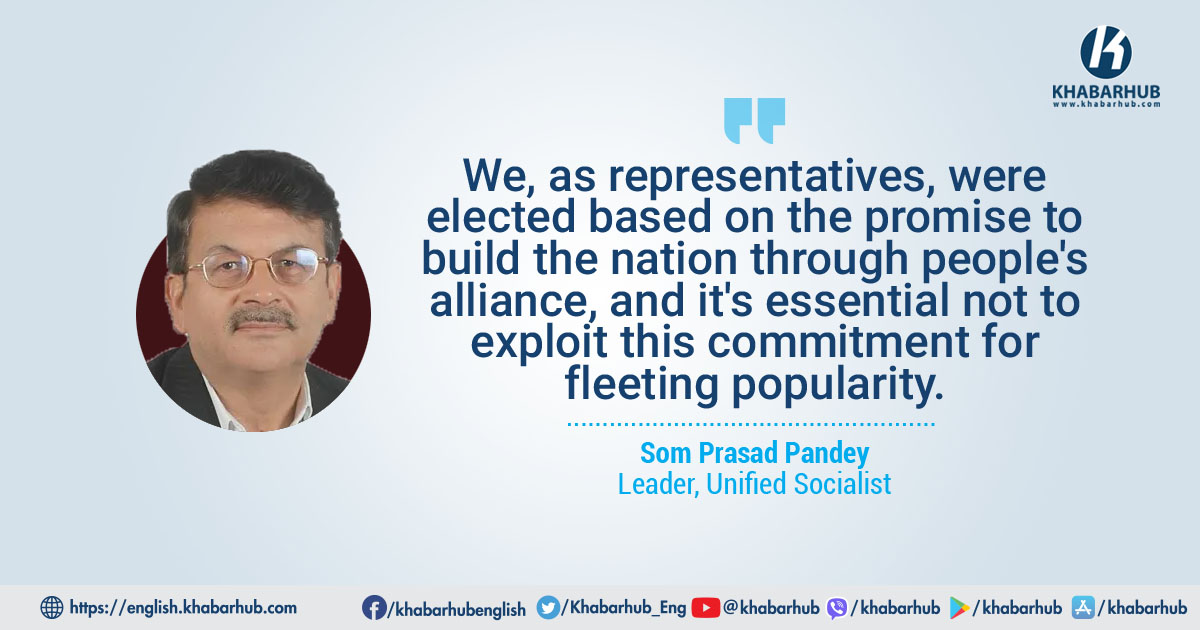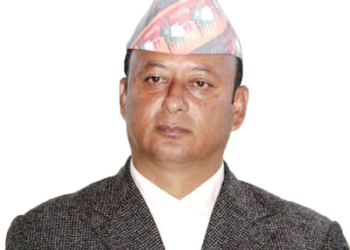KATHMANDU: The leaders of the ruling coalition are voicing opposition concerns.
Representatives participating in the recently concluded Mahasamiti meeting of the Nepali Congress also expressed that the ruling alliance has rendered the party organization ineffective.
The Maoist Center, led by Prime Minister Pushpa Kamal Dahal, has been accusing the Nepali congress for hindering their work.
The ruling alliance leaders, who pledged to address people’s issues through a continuous five-year government, are now questioned as to why they have not fulfilled this commitment and why the government’s effectiveness in terms of work is lacking.
The government’s inability to keep its promises raises questions about its longevity and whether a new equation is on the horizon.
Is the fortune of government leadership slipping away from the Unified Socialist, considered the mastermind of the current coalition?
In a conversation with Khabarhub, Unified Socialist leader Som Prasad Pandey tries to clear these concerns.
Are you observing indications that the alliance might face challenges when the Prime Minister is chosen from your party?
The current alliance is committed to a fixed term of five years.
This government was formed after the parliamentary election.
The connection, stemming from discussions between UML Chairman KP Oli, Maoist Center Chairman Pushpa Kamal Dahal Prachanda, and Nepali Congress President Sher Bahadur Deuba regarding the Prime Minister position, was both a necessity and a compulsion.
Historical evidence doesn’t support Oli’s ability to sustain a government.
I believe this alliance will endure for the next four years, and our gentleman’s agreement will be fulfilled after two years of Prachanda, Madhav Nepal, and Deuba serving as Prime Ministers.
Are you trying to convey a message of political stability or managing a government?
Our objective is to communicate the importance of political stability.
We have exhausted other alternatives, and although Oli had the power, he failed to maintain it.
Blaming others while holding a two-thirds majority is not a viable excuse.
This alliance is essential for political stability in the country.
Despite potential weaknesses in ministerial matters, are efforts being made to reinforce managerial aspects and deliver results, especially considering the government’s one-year tenure?
Yes, it has been a year since the formation of this government.
There are no excuses for not delivering good governance, prosperity, and progress in the country.
Our vision is clear– the well-being of the nation.
It’s crucial to address any ministerial weaknesses, strengthen managerial aspects, and actively contribute to the betterment of the country.
People will only trust us if we fulfill these commitments.
How do you view the prevailing character within Nepali Congress and CPN-UML for power, and will it impede the execution of the 2084 plan?
There is no alternative. While my profile may be modest, I am dedicated to studying and promoting party unity.
Some Congress leaders have voiced concerns about the alliance, but their objections lack substance.
Those opposing the coalition likely have hidden agendas unrelated to citizens and national issues.
Criticizing the alliance and advocating for its dissolution is an insult to the country and its people.
We, as representatives, were elected based on the promise to build the nation through people’s alliance, and it’s essential not to exploit this commitment for fleeting popularity.
As the 2084 election approaches, there’s speculation about the alliance facing disharmony. How do you think your new party will navigate this situation?
Some individuals, who fail to uphold the interests of the Nepalese people, may find joy in such speculations.
However, the 2084 election is still almost four years away.
Engaging in various projections at this stage seems futile.
It is premature to discuss the fate of the alliance, considering the uncertainties surrounding the country’s situation in the coming years.
Do you anticipate the Nepali Congress providing you with the Prime Minister’s position in the near future?
When we appointed Sher Bahadur Deuba as the Prime Minister earlier, we did so based on his victory in 22 seats, while our parliamentary strength was 18.
With 32 individuals present, history shows that Deuba, having directly won 22 seats, became the Prime Minister.
According to the Constitution, as long as there is an alternative, the parliament should not be dissolved, and the government should continue its operation.
In the case of Madhav Nepal becoming the Prime Minister, which article of the Constitution would be applicable?
Examining clauses 1 to 5 of Article 76, the Constitution does not restrict only one individual, like Prem Suwal, from becoming the Prime Minister, as clauses 2 and others can also be invoked.
This government can be formed based on sub-section 2 of Article 76, indicating the support of two or more parties.
Some leaders in the Congress claim that Article 2 of Article 76 is currently active, and after the Prime Minister’s resignation, it will automatically transition to Article 3, securing a significant party in the process. What’s your take on this?
The Constitution does not validate such claims; it’s merely their interpretation.
Since 2007 BS, both the Communists and the Congress have collectively worked towards democracy, a multi-party system, and a republic.
Consensus has guided our path, reflecting a shared commitment to the country. Raising such topics for popularity seems baseless, considering the historical context and the mutual love for the nation.
On one hand, you advocate for the Socialist Front, but when discussing a partnership with a power that labels Congress as a tool of feudalism and a class enemy, do you feel that the heart of Congress is aligned with the common people’s needs?
While such perspectives may exist in communist documents, they are not reflective of our party’s beliefs.
The idea of the Nepali Congress being an ally of broker capitalists was raised during the establishment of the Communist Party in 2007 BS.
However, we also acknowledge the historical collaboration between figures like Pushpalal, Ganeshman, and BP Koirala, who fought together for democracy and the republic. If the Congress can stand alone, why enter into alliances?
The constitution advocates for majority policy, requiring 139 out of 275 seats. Is it suggested by Congress leaders that they should contest elections independently?
The concept of alliances is not a recent introduction; it has been present in the past.
The alliance is a means to bring prosperity and good governance to the country. If established parties fail in this, people will lose faith in us.
How effective is the slogan of alliance and unity at present?
To the young party leaders who receive applause for their speeches on platforms, I say focus on citizens’ concerns and prosperity.
Talk of alliance and unity will follow. Making slogans against alliances is insufficient.
I have contributed to bringing the country to this point and operating industries. Let’s plan for the country’s prosperity, making economic leaps with water resources.
Our country ranks 10th in tourism among 245 countries; have the youth contributed to its development?
Talking about personal interests does not fulfill the responsibility towards the people.
How is your party currently positioned?
When the party was formed, we had a central committee of 345 people.
Although 33 members seem disturbed, more have joined.
Our party has received 477,000 proportional votes in the provincial election, with our mayors in Pokhara and Hetanda.
We are not weak, but we are also not complacent; we are actively expanding our organization.
Why is your party’s minister, Prakash Jwala, hesitant to demonstrate accountability in the Balkumari incident, and should the party take ownership of it?
The Ministry of Home Affairs is responsible for the security of ministers, and the minister’s movement is controlled by the PSO or the Nepali Army.
If proven wrong according to policy, he has to resign.
The Socialist Party believes in policy and law, and we will act accordingly if there is evidence of wrongdoing.









Comment